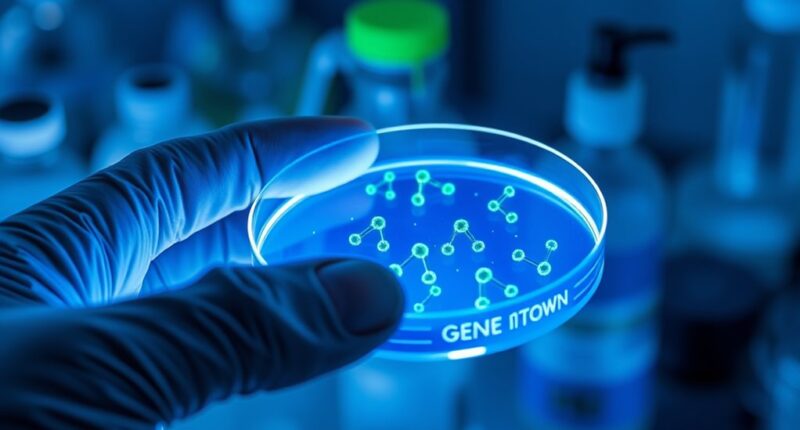Regeneron’s recent gene-editing breakthrough aims to permanently lower high cholesterol by targeting the genes responsible for lipid regulation. This innovative approach could shift treatment from ongoing medications to a one-time genetic fix, potentially revolutionizing cardiovascular health. However, there are ethical and safety concerns about long-term effects and unintended genetic changes. If you want to understand how this technology might impact your health and what challenges remain, keep exploring the details behind this breakthrough.
Key Takeaways
- Regeneron has developed a gene-editing approach targeting lipid regulation genes to potentially provide a permanent cure for high cholesterol.
- The breakthrough moves beyond symptom management, aiming to address the root genetic causes of elevated cholesterol levels.
- This innovative therapy could replace lifelong medication with a one-time, long-lasting genetic treatment.
- Safety and ethical considerations remain crucial, with ongoing research to ensure minimal risks and responsible application.
- If successful and properly regulated, this gene editing could significantly reduce heart disease and stroke risks linked to high cholesterol.

A recent breakthrough in gene editing offers hope for ending high cholesterol once and for all. Regeneron’s innovative approach leverages advanced gene editing technologies to target the root causes of elevated cholesterol levels. By focusing on specific genes responsible for lipid regulation, scientists aim to develop a one-time treatment that can permanently lower bad cholesterol, reducing your risk of heart disease and stroke. This progress is exciting because it signifies a shift from managing symptoms with lifelong medication to potentially curing the condition at its source.
However, as with any breakthrough in gene therapy, there are essential ethical considerations you should be aware of. CRISPR ethics, in particular, come into play when discussing gene editing in humans. Critics worry about unintended genetic modifications that could lead to unforeseen health issues or ecological impacts. The question of consent and the potential for gene editing to be used for non-therapeutic enhancements also raises concerns. It’s imperative that scientists, regulators, and society as a whole carefully evaluate these ethical dilemmas to guarantee the technology is used responsibly and safely. Transparency and rigorous oversight are indispensable to prevent misuse or reckless experimentation that could harm individuals or future generations.
Ethical concerns in gene editing include unintended effects, consent issues, and potential misuse requiring careful oversight.
When it comes to gene therapy safety, you should understand that while these treatments promise dramatic benefits, they also carry risks. Early-stage trials have shown promising results, but long-term safety data is still limited. There’s always a possibility of off-target effects—where unintended parts of the genome are altered—which could cause new health problems. Furthermore, immune responses to the gene-editing components might lead to adverse reactions. These safety concerns underscore why extensive clinical testing and regulatory scrutiny are necessary before such treatments become widely available. You’ll want reassurance that any therapy you consider has undergone thorough evaluation to minimize risks and maximize benefits.
Despite these ethical and safety challenges, the potential to eradicate high cholesterol through gene editing is groundbreaking. It could transform how we approach cardiovascular health, shifting from ongoing medication regimens to a permanent genetic fix. As Regeneron advances this technology, it’s important that you stay informed about the ongoing discussions surrounding CRISPR ethics and gene therapy safety. Responsible development, coupled with transparent communication, will be key to ensuring these innovations benefit society without compromising safety or ethics. With continued research and careful oversight, this breakthrough could indeed change countless lives for the better, freeing you from the burden of chronic high cholesterol.
Frequently Asked Questions
What Are the Potential Long-Term Risks of Gene Editing?
You might wonder about the potential long-term risks of gene editing. Ethical concerns arise because altering genes could have unforeseen consequences on future generations. Long-term safety remains uncertain since we lack extensive data on how edited genes behave over time. You should consider that while the technology offers incredible benefits, there’s a chance of unintended mutations or side effects that could impact health and the environment down the line.
How Accessible Will This Treatment Be Globally?
You’re probably wondering about global accessibility and cost implications of this treatment. As gene editing advances, it may initially be expensive and limited to wealthier nations. However, over time, costs could decrease with technological improvements, making it more accessible worldwide. Governments and organizations will play vital roles in ensuring equitable distribution, but disparities might persist, meaning some regions could still face barriers to receiving this groundbreaking therapy.
Can This Therapy Be Used for Other Genetic Diseases?
You’re asking if this gene therapy can tackle other genetic diseases, and the answer is yes, but it’s not a silver bullet. As with any breakthrough, there are ethical considerations to weigh. While gene editing shows promise, scientists are cautious about unintended consequences. This approach could revolutionize treatment options, but you’ll need to stay informed about ongoing research and ethical debates before expecting it to become a widespread solution.
What Is the Expected Timeline for FDA Approval?
You’re wondering about the timeline for FDA approval of gene editing therapies. Typically, after successful clinical trials, the FDA reviews data over several months to years. For innovative treatments like this, approval could take around 2 to 5 years, depending on the trial results and safety profiles. Keep in mind, the FDA prioritizes safety, so timelines may shift if additional data or reviews are needed.
Will This Breakthrough Replace Existing Cholesterol Medications?
Imagine a patient struggling with stubborn high cholesterol despite medication. You might wonder if gene therapy could replace their current treatments. While this breakthrough shows promise for transforming cholesterol management, it’s unlikely to immediately replace existing medications. Instead, it could serve as a powerful alternative or complement, especially for those with genetic conditions. Over time, gene therapy could revolutionize how you manage high cholesterol, making treatment more effective and personalized.
Conclusion
This breakthrough in gene editing feels like stepping into the future, where high cholesterol could become a relic of the past, much like the dial-up internet of yesteryear. You’re now on the cusp of a revolution, where cutting-edge science offers hope and new beginnings. As you look ahead, remember that this innovation could transform lives, ushering in an era of health and vigor. It’s a real game-changer, no less than a bright new dawn.










